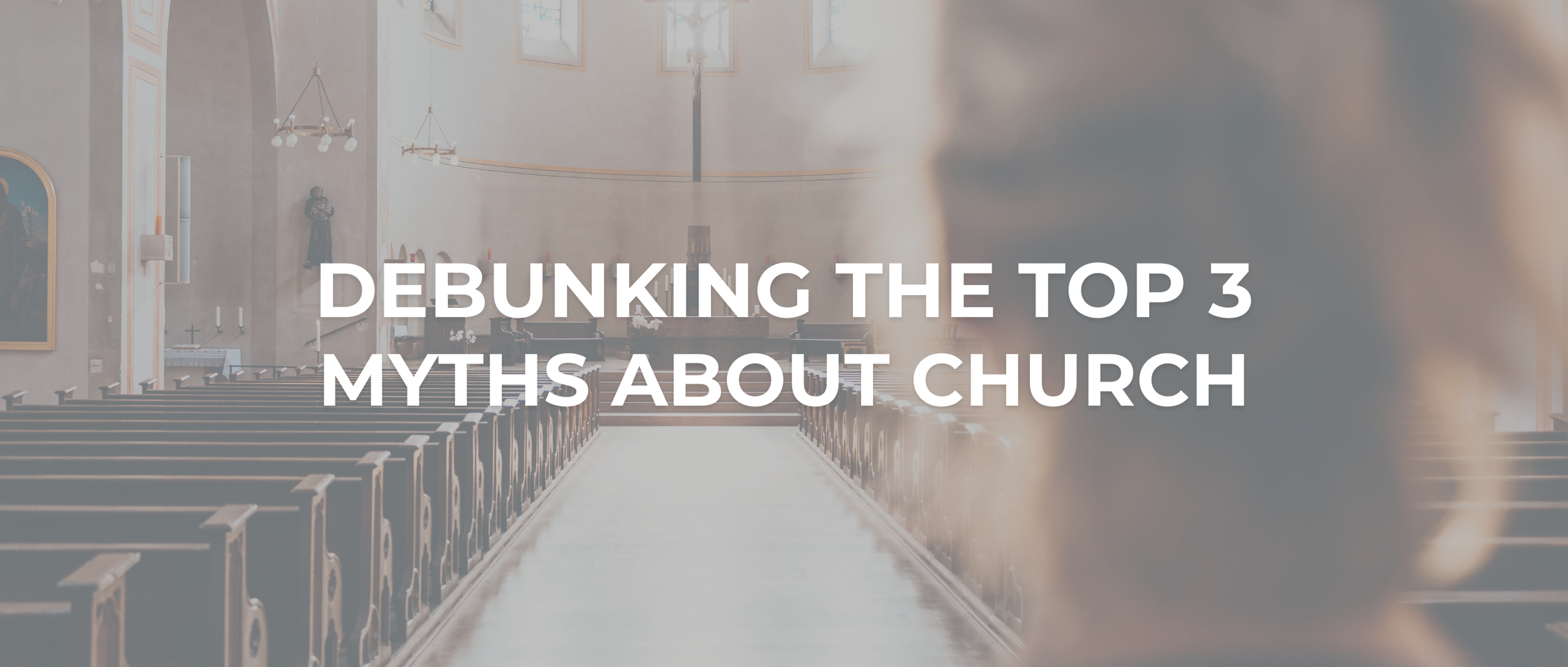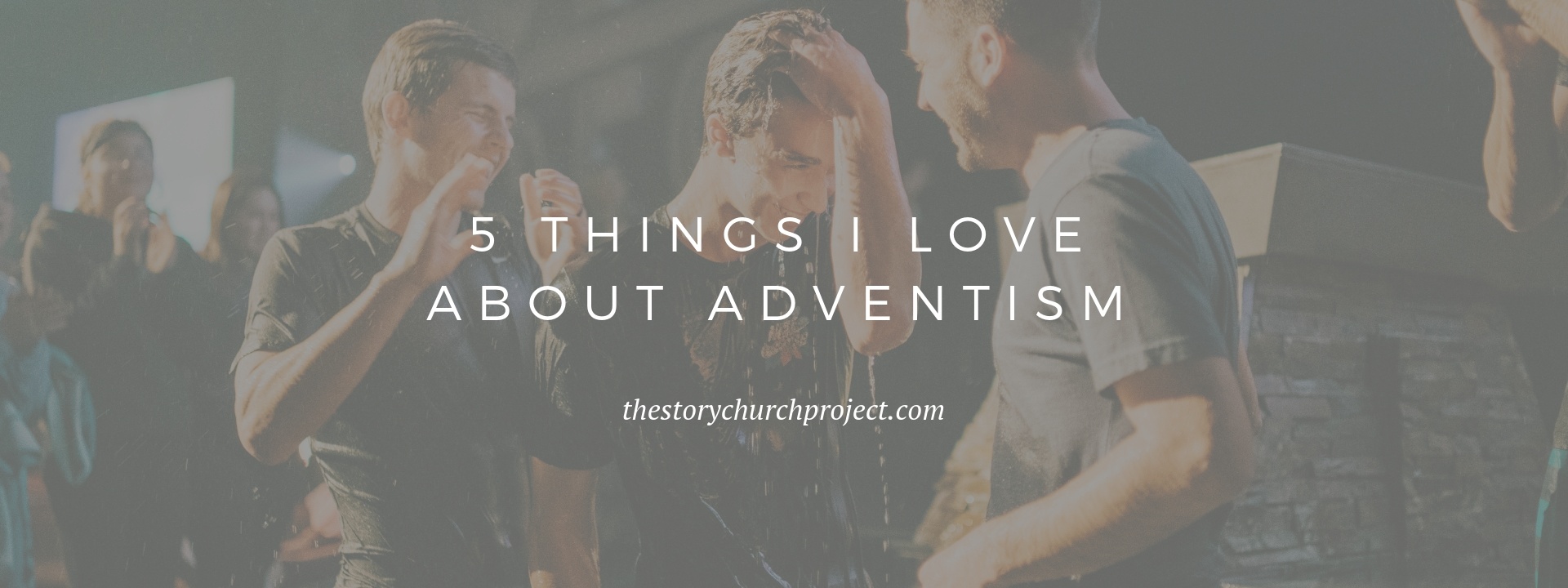There are lots of church myths floating around our churches these days, and these myths are not victimless. To the contrary, the more we believe them, the more they damage out ability to reach the world.
Let’s take a look at the top 3 and compare them to scripture:
MYTH ONE: THE CHURCH IS A SACRED BUILDING
One of my favorite verses in all of scripture is Exodus 25:8 where God says to the nation of Israel: “have them make a sanctuary for me, and I will dwell among them.”
God has set his people free from slavery and, as they journey through the dessert, he instructs them to build a “sanctuary”. And the reason is simple - “that I may dwell among them”.
Now this isn’t the first time this idea is seen in scripture. Way back in Genesis we see God personally designing humanity out of the dust of the ground. And as God finishes his design, the Bible says he breathes into man’s nostrils the breath of life. There is something special taking place here. There is this inanimate biological entity laying on the ground and the creator leans in and breathes. And man, the Bible says, became a living being.
The rest of creation God speaks into existence. But man? He gets personal on that one. It’s as if God is saying, “I like to be with people.”
Fast forward to Genesis 3:8-9 and man rebells against God. God’s responce is amazing,
Then the man and his wife heard the sound of the Lord God as he was walking in the garden in the cool of the day, and they hid from the Lord God among the trees of the garden. But the Lord God called to the man, “Where are you?”
Do I really need to comment on how cool it is that in their moment of rebellion God seeks man out? It’s as if God is saying, “I know what you have done. But I love you and like to be with you. So please tell me where you are!” And as the narrative unfolds we are introduced to a tragic plot twist - sin now seperates us from the God who likes to be with us.
Fast forward to Exodus 25 and God calls a nation of slaves to keep his story alive on the earth and then tells them, “make me a sanctuary so that I can dwell among you.” Why? Because God likes to be with people.
Fast forward to the New Testament and speaking of Jesus an angel says, “Look! The virgin will conceive a child! She will give birth to a son, and they will call him Immanuel, which means ‘God is with us.’” (Mat. 1:23)
Why God with us? Because, God likes to be with people.
Fast forward to the death of Jesus and the curtain in the temple, representing our separation from God, is removed. “At that moment” Matthew writes, “the curtain of the temple was torn in two from top to bottom.” (Matt. 27:51) At this moment, heaven is shouting to humanity - the separation is ended! Jesus is the sacrifice that reconnects us to the father. In him we are reconnected.
Notice what Paul adds in Hebrews 10:19-22 - “Therefore… we have confidence to enter the Most Holy Place by the blood of Jesus, by a new and living way opened for us through the curtain, that is, his body, and since we have a great priest over the house of God, let us draw near to God…”
Why? Because God likes to be with people.
And notice how the story ends in Revelation 21:1-3
Then I saw “a new heaven and a new earth,” for the first heaven and the first earth had passed away, and there was no longer any sea. I saw the Holy City, the new Jerusalem, coming down out of heaven from God, prepared as a bride beautifully dressed for her husband. And I heard a loud voice from the throne saying, “Look! God’s dwelling place is now among the people, and he will dwell with them. They will be his people, and God himself will be with them and be their God.
God likes to be with people. And all throughout scripture, he is working to close the gap, to draw near and end the separation. In the Old Testament, he closed that gap via the sanctuary which served as a symbol of God’s desire to be with people. But after the death of Jesus something amazing happens. The temple is no longer the place where God meets with man. Instead look at what Paul says to the church:
Don't you know that you yourselves are God's temple and that God's Spirit dwells in your midst? - 1 Cor. 3:16
Now here is the thing. Paul is not talking about the church building! Because nowhere in the NT do you ever find any reference to the church as being a building. Instead Paul is talking about the people because in scripture the church is not a building it is people. God dwells in us, not in a building. And the beauty of church being a people is that instead of “going” to church, the New Testament teaches we “are the church”.
This means that while the temple was the place where God dwelled with people in the Old Testament, in the New Testament the people are the place where God dwells. In short, You are God’s temple - individually and collectively God dwells with humanity through us - flesh and bone.
But somehow, we have bought into this big lie that church is a building. And that big lie results in three tragic outcomes.
First, people begin to think of a church building as “sacred space” where you have to behave extra well but when they aren’t in the building they are no longer in “sacred space”. This leads to divided living where we can be one person out there and the moment we walk into the church building its like Dr Jekyl turns back into Mr Hyde. And this is not biblical at all. The church building doesnt even exist in the NT and we treat it as some super holy space where you can’t do x y z and then we leave the building and its like - “phew I’m not in Gods presence anymore so now I can gossip”. Where do we read this in scripture?
Because of this, people no longer live in the presence of God on a daily basis. Its like he is only there in the building. And so people are no longer living in the presence of God always but compartmentalise God’s presence to a man made structure.
And finally, people lose sight that they are the church. So everything God centred gets relegated to the building and its services. And today many Christians think that church is a building and don’t realise that they are the church every day and every where, God dwells with man through them—not buildings.
MYTH TWO: THE CENTRE OF CHURCH IS THE MAIN SERVICE
The sanctuary reveals that God likes to be with people. What this demonstrates is that the center of scripture a relational God who wants to be in relationship with people. And when the early church gathered under this idea, they ate together, read the word together and celebrated the last supper (communion in which we ‘commune’ with God and celebrate our ‘union’ with him).
Why? Because God likes to be with people.
Luke records:
Every day they continued to meet together in the temple courts. They broke bread in their homes and ate together with glad and sincere hearts, praising God and enjoying the favor of all the people. And the Lord added to their number daily those who were being saved. (Acts 2:46-47)
and,
They devoted themselves to the apostles' teaching and to the fellowship, to the breaking of bread and to prayer. (Acts 2:42)
In the new testament there was no such thing as a church service. The central aspect of a church gathering in the NT was communion in which we celebrate the end of separation from God and the sanctuary nature of God.
Why? Because God wants to be with people.
But what is church today?
Fracis Chan captured it pretty well when he said,
Church today has become predictable… You go to a building, someone gives you a bulletin, you sit in a chair, you sing a few songs, a guy delivers maybe a polished message, maybe not, someone sings a solo, you go home… is this all God intended for us?
Let me frame it this way: Where in the NT do you find instructions on when the church should meet? Or how many songs to sing? Or whether there should be a platform party at the front or not? Or whether we should sit in rows or tables? Where in the NT do we see people stressed out with questions like: Is the program running smooth? Is the song service running too long? Have the details been organized well? Is the bulletin accurate? Did we miss an announcement? Was the special item good? Was the preacher inspiring?
Now none of that is inherently bad. There is nothing wrong with being organised, that’s biblical. The problem is we spend all our energy doing what God has never spoken about and have little time to do what he has spoken about. In fact, I have been to churches where they haven’t reached a soul for ten years (which God commanded us to do) and no one seems fussed. But you touch one detail in the program and its an all out war! It’s like “yes! we will die for what God has not spoken about while ignoring the clear commands he has given us.”
And this brings me to my final myth.
MYTH THREE: THE CHURCH’S MISSION IS THE PASTORS JOB
The sanctuary nature of God means God wants to be with people. Sin separates us from him but God initiates a plan to bring us back to himself—this is the sanctuary.
But here is the cool thing. Part of God’s plan to bring people back to himself involves a secret weapon.
Let me share this secret weapon with you. Im going to quote from Ephesians 3: 3, 5-6, and 10-11. Paul writes,
God himself revealed his mysterious plan to me… God did not reveal it to previous generations, but now by his Spirit he has revealed it to his holy apostles and prophets.
And this is God’s plan: Both Gentiles and Jews who believe the Good News share equally in the riches inherited by God’s children. Both are part of the same body, and… belong to Christ Jesus.
God’s purpose in all this was to use the church to display his wisdom in its rich variety to all the unseen rulers and authorities in the heavenly places. This was his eternal plan...
Did you catch that? Through the church, God not only reaches out to the people he likes to be with but through it God reveals his heart to the entire universe.
But here is the crazy thing. Gods secret weapon is the church but the church is not a building and its not a program, the church is people. But its more than that! Notice what Paul says about these people just a chapter before:
Once you were dead because of your disobedience and your many sins. You used to live in sin, just like the rest of the world, obeying the devil…. All of us used to live that way, following the passionate desires and inclinations of our sinful nature. By our very nature we were subject to God’s anger, just like everyone else. (Eph. 2:1-3)
In other words, God’s secret plan to defeat evil, dwell with humanity and glorify himself is a group of people (the church) but not just people—imperfect people—just like everyone else.
God bypassed perfect and loyal angels and instead has chosen, from history past, that his secret weapon would be messed up people who are just like everyone else. And what does he do with this group of messed up “just like everyone else” people? Peter hits the nail on the haid in 1 Peter 2:9 when he writes:
But you are a chosen generation, a royal priesthood, a holy nation, His own special people, that you may proclaim the praises of Him who called you out of darkness into His marvelous light.
Please tell me you caught that! God’s secret weapon is shockingly unexpected. Instead of angels or super holy people, God’s secret weapon is imperfect, unholy people—just like everyone else—whom he would transform into a kingdom of priests and then through them reveal his heart to the world and beyond.
This means you are a priest. All of you. And what is a priests job? To help bring the sinner into contact with God.
It’s about bringing the two together. And that is you and that is me, all of us priests because God has called all of us to be a part of his dwelling with humanity because God likes to be with people.
The mission of the church doesn’t belong to a pastor. It belongs to people—unholy people, just like everyone else, saved by grace and called to be priests on the earth.
Wow.
Most of us have no idea what church is in the Bible and we can see the effects all around us.
Adventist churches are dying, splitting and barely functioning.
We think its a building with a program and its own fultime CEO pastor who does it all so we can sit back and get fed. But this is not church. You don’t find that anywhere in the NT.
Instead, the Bible declares that you are the church, that the centre of church is not a program but people and that each of us imperfect, messed up people have been reclaimed by God’s grace and called to be a kingdom of priests with one mission: To point others to Jesus.
Because God likes to be with people.





